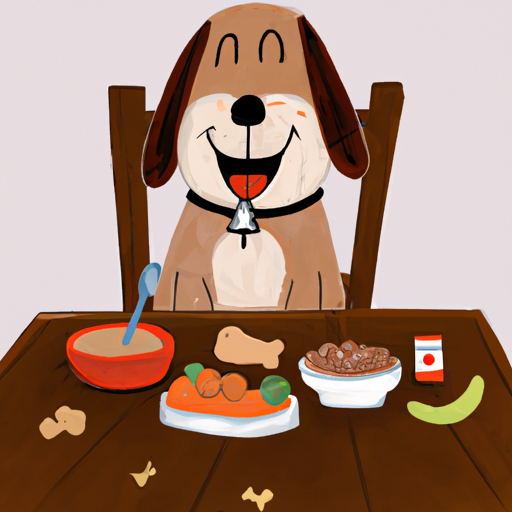Understanding Your Dog’s Dietary Needs
As a caregiver to your beloved furry friend, it’s essential for you to understand their dietary needs. Dogs, like humans, require a balanced diet to stay healthy. Contrary to the popular belief that dogs should only eat meat, they are actually omnivores. This means that they need a mix of both animal and plant-based foods in their diet.
Dogs require the following components in their diet:
- Protein (meat, eggs, dairy)
- Carbohydrates (grains, vegetables)
- Fats (from meat and oil)
- Vitamins and Minerals (from a variety of foods)
Foods Dogs Love
Now that you know what your dog needs to eat, let’s look at what they love to eat. Here’s a table of some favorite canine delicacies:
| Food | Why Dogs Love It |
|---|---|
| Steak | High in protein and fats, both of which dogs need. |
| Peanut Butter | Not only is it tasty, but it also provides healthy fats and proteins. |
| Carrots | They provide a satisfying crunch and are excellent for your dog’s teeth. |
Remember, while these foods are safe for dogs, always introduce any new food gradually to monitor for any adverse reactions.
Foods to Avoid
While dogs may love a variety of foods, not all are safe for them. Here are some foods you should avoid giving your dog:
- Chocolate: It contains theobromine, a harmful substance for dogs.
- Grapes and Raisins: These can cause kidney failure in dogs.
- Onions and Garlic: They can cause anemia in dogs.
Adjusting Your Dog’s Diet
As a caregiver, you’ll need to adjust your dog’s diet according to their age, size, breed, and health status. Puppies and older dogs require different types and amounts of food, and certain breeds may have specific nutritional needs. If your dog has any health issues, like diabetes or allergies, you’ll need to consider these when preparing their meals.
Feeding Time Tips
Feeding your dog is not just about what you feed them, but also how you feed them.
- Always provide fresh water alongside their meals.
- Establish a regular feeding schedule.
- Avoid giving your dog food from your plate, as it encourages begging and could potentially expose them to harmful foods.
FAQ
Q: Can I feed my dog only dry food?
A: While dry food can be a part of a balanced diet, it’s also important to include fresh foods to provide variety and additional nutrients.
Q: My dog loves cheese. Can I give it to them?
A: Cheese can be a great treat in moderation, but too much can lead to obesity and other health issues.
Q: How often should I feed my dog?
A: Most dogs should be fed twice a day, but the exact amount depends on their size, age, and activity level.
Remember, when it comes to your dog’s diet, it’s always best to consult with a veterinarian. They can provide the most accurate and personalized advice for your furry friend.



